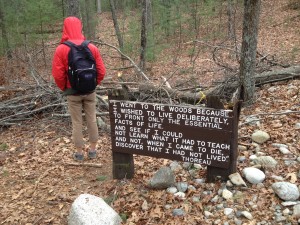I went to the woods because I wished to live deliberately, to front only the essential facts of life, and see if I could not learn what it had to teach, and not, when I came to die, discover that I had not lived. – Henry David Thoreau
I found myself these past two weeks reflecting more than usual on life and death. First, because my father—three months shy of his 80th birthday—was having one of those surgeries that is far more involved than the ninety minute time frame would suggest; a surgery that has become almost routine (more than a hundred performed each year in this hospital alone) but could go mortally wrong in an instant; a surgery that is merely a precursor to another, which is at the same time far more complex and far less risky. At least, that’s my non-medical perception.
But my reflection has also been inspired by my son, who turned 21 last week—an age at which he may now do almost anything legal other than rent a car from a major agency. He’s also had his run-ins with death, beginning in the first moments of his life when his bluing skin and an infant oxygen tent made me eternally grateful for the calm confidence of the delivery-room nurses. Two-thirds of his life later, he spent two weeks in the hospital for an appendectomy that in many cases would be an outpatient procedure; we, on the other hand, were told not less than five times in three days, “this is serious; he could die.”
And here I am, gratefully positioned between a father and a son who both have taunted death time and again—my dad, until last year, on snow skis at 12,000′; my son on the rugby pitch for a couple years and now on boulders and climbing walls wherever he can find them.
Facing death, I’ve found—even as but a slim possibility—is made easier when life has been fully lived. That’s what took Thoreau to his cabin on Walden Pond. It’s why it tends to be easier (though not easy) to say goodbye to an aged parent than to a child, or a young mother.
And we can face death without fear when we have the confidence of our destination. Paul described it with the words, “to live is Christ, and to die is gain” (Philippians 1:21). Jesus comforted Martha, “I am the resurrection and the life. Whoever believes in me, though he die, yet shall he live” (John 11:25).



